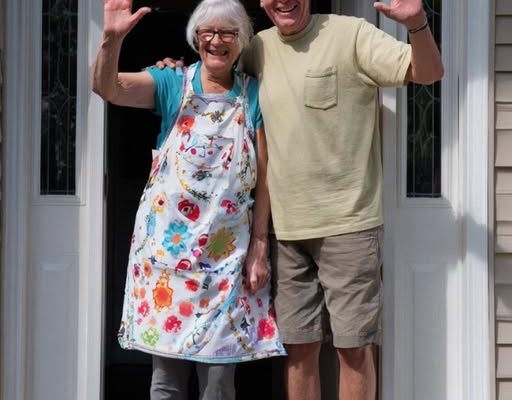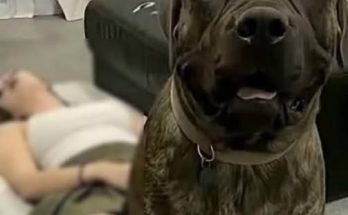The invitation came on a Tuesday while Liam and I were elbow-deep in suds, passing plates like we were on a quiet assembly line. We’d been married eleven months, still learning each other’s rhythms, when he cleared his throat and said, “Mom wants us to come to Sage Hill for a week.” He avoided my eyes and scrubbed the same plate twice. “They miss me.”
“When?” I asked, even though his tone already told me the answer.
“This weekend. I… may have said we’d probably come.”
It stung—being volunteered without being asked—but I swallowed it. “Sure,” I said, because marriage is compromise and because he looked so hopeful I didn’t know how to do anything else.
Betty and Arnold were waiting on the porch when we pulled up. The house looked like a postcard—peonies along the walkway, a white swing that squeaked gently in the breeze. Betty practically launched herself off the steps and wrapped herself around her son like he’d returned from war. She smelled like expensive hairspray and vanilla. When she finally turned to me, her hug was softer, lighter, like tapping a stamp on a letter she didn’t really want to send.
“I’ve been cooking all morning—pot roast, green beans, and apple pie,” she said, her arm still threaded through Liam’s. “All Liam’s favorites.”
We ate in a dining room that shimmered with polished silver and perfected stories about Liam’s childhood. Every conversation curved back to him like a homing pigeon. When I complimented the meal, she waved it off as “nothing special.” When Liam praised the same dish five minutes later, it became a sacred family recipe passed down from her grandmother with a wink and a sigh. I tried to laugh along. I tried to belong.
Later, she produced photo albums like a magician pulling scarves from a sleeve. There was Liam with a missing tooth. Liam with a fishing pole. Liam in a tux at a school dance beside a blonde girl with a confident smile.
“Who’s that?” I asked.
“Alice,” she said in a tone I had not yet heard—soft and warm. “Such a sweet girl. Close friends all through high school. She’s a nurse now. Still single.” She glanced at me like we were sharing a joke I didn’t get.
That night I lay awake next to Liam while he breathed evenly, the old house popping and sighing around us. At two a.m., I gave up and went for water. The hallway was a dim tunnel; the kitchen glowed at the end of it like a stage. I heard a voice before I saw her.
“Yes, the marriage went through just like we planned,” Betty whispered. “Don’t worry… she won’t be around for long. I’ll handle it personally.”The words slid under my skin like ice water. I rounded the doorway and stopped. The kitchen was lit by a single overhead bulb and one candle on the table, the flame jittering. Spread around it were photographs—our wedding, our honeymoon, my face beaming into the lens. Some photos were whole. Some were blackened at the edges, curled into ash in a ceramic bowl. Betty was in a dark robe, her silver hair tied back with a black scarf, her lips moving quickly around words I didn’t recognize.
When she saw me, she jolted, then recovered with a smile that fit her face like a rubber mask. “Oh, sweetheart! I was just praying for you. For a baby. For good health.” She nudged the bowl aside, but not before I saw a charred sliver of my own cheekbone.
“I couldn’t sleep,” I said. “Just wanted some water.”
Upstairs, I shook Liam until he blinked at me. “Please. Come downstairs. Your mother was burning our photos. She had a candle. She was saying something—”
He pulled on a T-shirt and followed, groggy. The kitchen was spotless. No candle. No photos. No bowl. Only the faint, acrid ghost of burnt paper in the air, light as a stain you can’t scrub out.
“I don’t see anything,” he said gently. “Maybe a bad dream?”
“I wasn’t dreaming.”“Let’s talk in the morning.”
In the morning, I packed. He sat beside me while I folded shirts with shaky hands. “We don’t have to leave,” he said. “I’ll talk to Mom.”
“Do you believe me?”
“I believe something scared you.”
He spoke to Betty; he came back with a half-apology on her behalf and a puzzled frown. “She says she doesn’t know what you’re talking about.”“Of course she does,” I said. “Give me one more day. I’ll watch.”
Dinner that night was a gauntlet. “Maybe I should teach you cooking basics, Greta,” Betty said lightly, passing the potatoes. “Liam grew up with proper home-cooked meals. He’s used to a certain standard.”
“Greta’s a great cook,” Liam said quickly.
“I’m sure she tries her best. Not everyone’s the nurturing type. Some women are very modern and independent.” She smiled like it was a compliment.
I smiled back because my other option was to flip the table.The next afternoon, she announced she was taking Liam to an eye appointment. “We’ll be gone an hour,” she sang. “You relax.”
The car had barely turned the corner before I was in her bedroom, my pulse thudding in my throat. I hated myself for snooping. I hated myself more for needing to. In the bottom drawer, beneath neat stacks of linen, I found them: crude fabric dolls bound with black thread, pins driven through their bellies. One had my wedding photo face taped to its lumpy head. There were burned photographs, scorched holes where my eyes should be. A thick notebook filled with symbols and recipes for… what? Protection? Punishment? Power?
I took pictures of everything. Every page. Every doll. My hands shook so badly I had to steady the phone against the dresser. A car door slammed outside; I shoved everything back and closed the drawer with a soft click that sounded, to me, like a gunshot.
At dinner, I set my fork down and looked her in the eye. “Why do you want me gone?”
She laughed, bright and brittle. “What a strange question, dear.”
“Then you won’t mind getting us fresh sheets,” I said, standing. “We stained ours.”
She led us to the linen closet with a smile that could cut glass. While she stretched for the top shelf, I yanked open the bottom drawer. The dolls and photos spilled out like secrets.
Liam stared. “Mom… what is this?”
Her face didn’t break so much as melt. “You weren’t supposed to see that,” she said calmly.
“Are you doing this to my wife?” His voice cracked.
“You were supposed to marry Alice,” she said, as if telling him he’d bought the wrong brand of detergent. “A good girl from a good family. Not this outsider.” She flicked a glance at me that made me feel like lint on a suit. “I was protecting you. Making it easier when the right woman came along.”
“You’re sabotaging my marriage,” I said quietly.
“If you don’t want problems,” she said, “leave tonight.”
We didn’t. Not that second. We slept with the guest room door locked and our bags half-zipped by the dresser. In the gray light before dawn, I uploaded the photos from my phone to a private Facebook group that included her church circle and favorite neighbors. I typed a caption with hands that felt very steady: Betty’s hobby: “prayers” at 2 a.m. Burning my wedding photos, sticking pins in dolls with my face. Beware of women who hide curses inside casseroles.
By noon, her phone was buzzing off the table. By evening, whispers had ripened into calls. I sat on the porch and listened to her explain, then explain again, each apology shriller than the last. Arnold walked around in tight circles, muttering, “For heaven’s sake, Betty.” Liam carried our suitcases down the steps and looked at me like he finally saw all the way through the fog.
“Ready?” he asked.
I looked at the peonies and the swing and the kitchen window where, if you squinted, you could almost see a candle burning that wasn’t there. “Ready.”
We drove toward the highway with the windows cracked and the air moving, my phone buzzing with messages from neighbors who had always suspected something, from church ladies who suddenly remembered odd stories. The truth doesn’t always set you free gently; sometimes it drags you by the wrist.
Liam found my hand and held it. “I’m sorry,” he said simply. “Thank you for fighting when I didn’t know how.”
“Some battles are worth it,” I said. “Especially the ones that protect the life we’re building.”
We didn’t need candles or dolls or incantations. The only spell I cast was daylight. Sometimes that’s the most powerful magic there is—the kind that leaves nothing for the darkness to hide behind.



